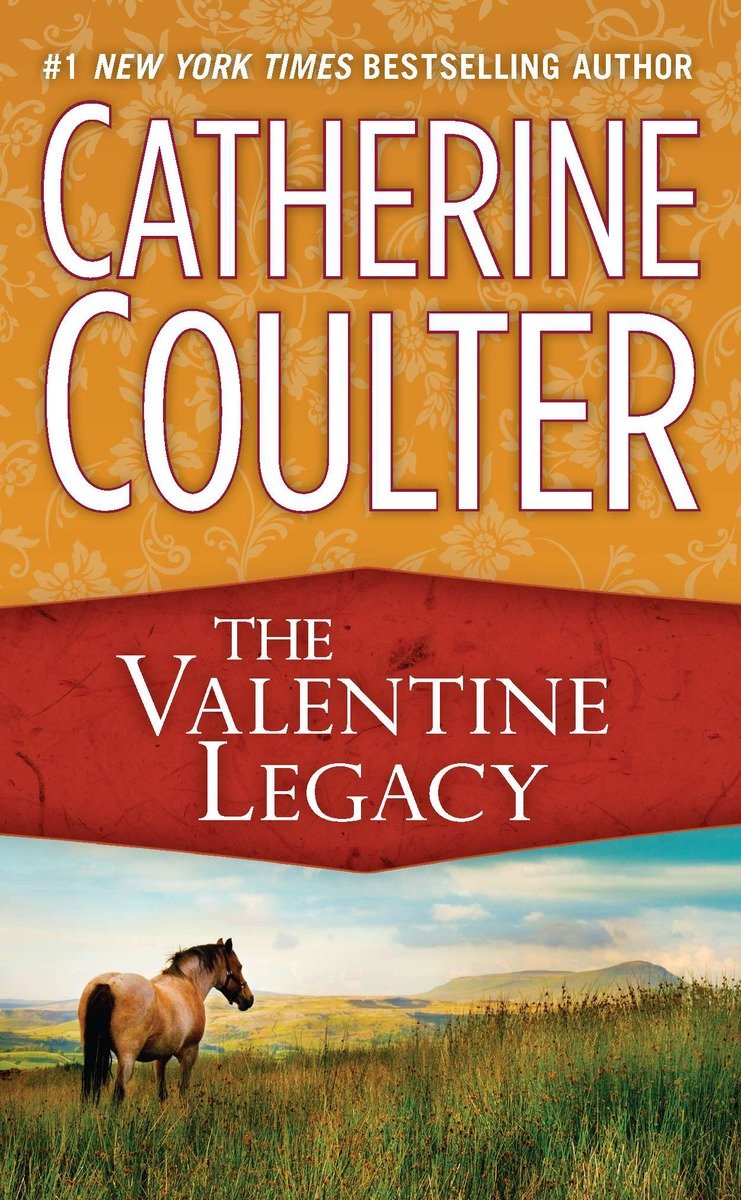The Valentine Legacy
8.99 JOD
Please allow 2 – 5 weeks for delivery of this item
Description
When an intrepid horsewoman finds herself on the road to ruin, her longtime nemesis may be her only hope in this Regency romance in the Legacy Trilogy by #1 New York Times bestselling author Catherine Coulter.Horse racing is a down and dirty sport. James Wyndham, who owns racing stables in both England and America, meets his match in red-haired Jessie Warfield, a renowned hoyden and champion jockey who knows as many dirty racing tricks as James does. When either wins a race, the other’s nose gets rubbed in the dirt. But when an innocent incident leads to her ruin in the eyes of society, it’s Jessie who finds herself fleeing a losing battle—all the way to England.James is laden with guilt, but when he follows Jessie across the Atlantic to make things right, the woman he finds bears little resemblance to the spitfire he’s known for so long….
Additional information
| Weight | 0.26105 kg |
|---|---|
| Dimensions | 2.8956 × 10.7188 × 17.3736 cm |
| by | |
| Format | Paperback |
| Language | |
| Publisher | |
| Year Published | 1996-9-1 |
| Imprint | |
| Publication City/Country | USA |
| ISBN 10 | 0515118362 |
| About The Author | Catherine Coulter is the #1 New York Times bestselling author of the FBI Thrillers featuring husband and wife team Dillon Savich and Lacey Sherlock. She is also the author—with J. T. Ellison—of the Brit in the FBI series. She lives in Sausalito, California. |
Praise for the Legacy Trilogy “Coulter is excellent at portraying the romantic tension between her heroes and heroines, and she manages to write explicitly but beautifully about sex as well as love.”—Milwaukee Journal “Entertaining reading with interesting and varied characters, historical local color, and a well-paced plot.”—Rocky Mountain News “Marcus and the Duchess are sparring lovers worthy of Shakespeare’s Beatrice and Benedick…and their supporting cast is every bit as much fun.”—Detroit Free Press “Coulter’s characters quickly come alive and draw the reader into the story. You root for the good guys and hiss for the bad guys. When you have to put the book down for a while, you can hardly wait to get back and see what’s going on.”—The Sunday Oklahoman “There is murder, mystery, and sex in this engaging story…It’s hilarious at times, and in the usual good writing and intricate plotting style of Ms. Coulter.”—The Chattanooga Times “Delightful…brimming with drama, sex, and colorful characters…Her witty dialogue and bawdy, eccentric characters add up to an engaging, fan-pleasing story.”—Publishers Weekly “An unlikely, exuberant adventure.”—Booklist “A cast of wonderful characters are part of this funny, lively, and occasionally mysterious story.”—Library Journal |
|
| Excerpt From Book | NEAR BALTIMORE, MARYLANDMARCH 1822SLAUGHTER COUNTY COURSE: SATURDAY RACES,LAST RACE, ONE-HALF MILEHE WAS GOING to lose. He didn’t want to lose, dammit,particularly to Jessie Warfield, that obnoxious brat. He couldfeel Rialto just behind him: hooves pounding firm andsteady on the black dirt, head stretched long, muscles hardand bunched. He looked over his left shoulder. Rialto wascoming on faster than a man escaping from a woman’s bedchamberbefore her husband come through the door, and thedamned five-year-old had more endurance than an energeticman with four demanding wives.James stretched as far as he could and pressed his faceas close as he could to Tinpin’s ear. He always talked to hishorses before and during a race to gauge their moods. GoodnaturedTinpin was always open to James. Tinpin, like mostof his racehorses, was a fierce competitor; he had greatheart. The horse wanted to win as much as James did. Theonly time he was distracted from victory was when a jockeyhad slammed his riding crop on his side, sending him intoa rage. He’d nearly killed that damned jockey and lost therace in the process.James felt old Tinpin’s labored breathing beneath him.The horse was more a quarter-mile sprinter than a half-milerso Rialto had the advantage there, in both ability and ex-perience. This was only Tinpin’s second half-mile race.James kicked his sides, telling Tinpin over and over that hecould do it, that he could keep the lead over that miserablelittle chestnut, that he could kick Rialtonamed after a sillyVenetian bridgein the dirt. He had to make his move nowor it would be too late. James promised Tinpin an extrabucket of oats, a dollop of champagne in his water. Thehorse gave a final burst of speed, but it wasn’t enough.He lostby only a length. Tinpin’s sides were heaving.He was blowing hard, his neck lathered. James walked himaround, listening to the groans and cheers of the crowd. Hestroked Tinpin’s wet neck, telling him he was a bravefighter, that he would have won if James hadn’t been ridinghim. And he probably would have won, dammit, despiteJames’s reputed magic with his horses. Some claimed thatJames as good as carried some to his horses over the finishline himself. Well, he hadn’t carried any horse anywherethis day.Actually he hadn’t even come in second after Rialto. He’dplaced third, behind another chestnut thoroughbred from theWarfield Stables, a four-year-old named Pearl Diver whohad nosed past Tinpin at the last moment, his tail flickingover James’s leg.Tinpin didn’t have much bottom, but then again thishadn’t been a four-mile flat race, it had just been a half-mileand bottom shouldn’t have mattered. What had mattered hadbeen James’s extra weight. With a lighter rider on his back,Tinpin would have won. James cursed, slapping his ridingcrop against his boot.‘‘Hey, James, you lost me ten dollars. Curse you!’’James was leading Tinpin back to his stable lad, his headdown. He sloughed off his depression and smiled toward hisbrother-in-law, Gifford Poppleton, striding toward him likea civilized bullshort, powerful, but not an ounce of fat onhim. He liked Giff and had approved his marriage to hissister, Ursula, the year before. ‘‘You can well afford it,Giff,’’ he shouted back.‘‘I can, but that’s not the point.’’ Gifford dropped into along, lazy stride beside him. ‘‘You tried, James, but you’rejust too damned big to be a jockey. Those other jockeysweigh four stone less than you do. Fifty-something extrapounds make a lot of difference.’’‘‘Bloody damn, Giff, you’re brilliant,’’ James said, strikinga pose. ‘‘I wish I’d known. And here I thought only theexperts knew that.’’‘‘Well, I know a lot of things,’’ Giff said, striking a pose.‘‘I wish I’d known. And here I thought only the expertsknew that.’’‘‘The brat weighs even less,’’ James said.‘‘The brat? Oh, Jessie Warfield. That she does. Too badabout poor Redcoat breaking his leg in the second race. Nowthere’s a jockey. You trained him well. What does heweigh? One hundred pounds?’’‘‘Ninety pounds on a sunny day. Do you know how hebroke his leg? Another jockey ran him into a tree.’’‘‘It hurt me to see it. You know, James, someone needsto make some rules about racing. All this mayhem is ridiculous.I read about a race in Virginia where the favoredhorse was poisoned the night before the race.’’‘‘It might be ridiculous,’’ James said, ‘‘and it might beoccasionally dangerous, but it’s fun, Giff. Leave things be.Just be careful whom you bet with.’’‘‘As if you cared. Hey, Oslow, how are you doing?’’Oslow Penny was the head of James’s breeding farm. Onrace days, though, he was the head stable lad who oversawthe handling of all the horses to race at the meet. He was awalking oral history, at least that’s what James called him.The Maryland Jockey Club was beginning to agree. Oslowknew the direct line back, or the tail-male, of every horsethat ran from South Carolina to New York. He also knewevery current sire and every dam and every get from everyracehorse in America and Britain.Oslow approached them, muttering under his breath, andgently removed Tinpin’s reins from James’s hand. He wasbowlegged, scrawny-looking, and had the most powerfulhands James had ever seen. His face was weathered andseamed, his brown eyes as powerful with intelligence as hishands were with strength.He squinted through the bright afternoon sun up at Gifford’sface. ‘‘Good afternoon, sir. I’m doing as fine as LillyLou did at the Virginia High Ebb races just last week. Betterthan Mr. James, that’s for sure. Aye, and how are you doin’,boy? Winded, are you? Well, you did your best, did betterthan Dour Keg, that knock-kneed creature old Wiggins stillpersists in racing. Hell, I don’t even remember who his sirewas, that’s how bad he is.’’‘‘Did you bet on Mr. James, Oslow?’’‘‘Not I, Mr. Poppleton,’’ Oslow said, stroking a gnarled,veiny hand over Tinpin’s neck. ‘‘I would have if Redcoathad ridden him, poor lad, but not Mr. James. Mr. James hasjust growed too big, just like Little Nell, who ate her headoff four years ago and couldn’t barely shuffle over the finishline at the Dickey races in North Carolina, clean in lastplace.’’Gifford laughed. ‘‘You think I could have done betterthan Mr. James?’’Oslow spat just beyond Tinpin’s shoulder. ‘‘Not with thatpair of hands you got, Mr. Poppleton. Sorry, sir, but you’vegot ham-hands, not like Mr. James, who has magic runningout the ends of his fingers into the horses.’’‘‘Thank you, Oslow, for something,’’ James said. ‘‘Now,Gifford, let’s go see Ursula. I don’t suppose you broughtCatherine Coulter 450our mother with you?’’ He patted Tinpin’s neck as hemoved away.‘‘No, thank God. She tried to talk Ursula out of comingto this godless place.’’James laughed. He was still grinning when he saw theWarfield brat striding toward him, looking just like a boy,still wearing a riding hat with her violent red hair shovedup under it. Her face was red from the hot sun. A line offreckles bloomed across her nose.He didn’t want to stop, but he did. It was hard. He’d justas soon ignore her for the rest of his days, but he was agentleman, dammit.‘‘Congratulations,’’ he said, trying to unclench his teeth.She’d beaten him often since she was knock-kneed kid offourteen, but he still hated it. He never got used to it.Jessie Warfield paid no attention to Gifford Poppleton,president of the Union Bank of Baltimore, as she came toeto-toe with James and said, ‘‘You tried to shove me intothat ditch on the second lap.’’A dark blond eyebrow went up. ‘‘Did I now?’’She came up onto her tiptoes, her nose an inch from his.‘‘You know you did. Don’t even consider lying, James. Itwas close. If I weren’t such a bloody good rider, I wouldhave gone over the edge. But I didn’t. I came back and beatyoubeat you but good.’’‘‘You certainly did,’’ he said easily, wanting to smackher. Some sportsmanship. She was a female. If she were amale, she’d know it wasn’t right to rub the loser’s nose inhis defeat. Although, he thought, when he next beat her, hewas going to rub her entire face in the dirt.‘‘Do you know your lips are chapped? Do you know Ican count your freckles from this distance?’’ he said, then‘‘one, two, threegoodness, there are so damned many ofthem it would take me a week.’’She backed up fast. ‘‘Don’t try it again, or I’ll take myriding crop to you.’’ She licked her chapped lips, shook thecrop in his face, nodded to Giff, and strode off.Gifford said, ‘‘It looked to me like you did nudge Tinpininto her horse, James.’’‘‘Yes, but not hard enough. I just wanted to get her attention.It was nothing compared to what she did to me lastyear at the June races in Hacklesford.’’‘‘Well, what did she do, this fearsome girl?’’‘‘I was crowding her just a bit, just to teach her a lesson.She knows every dirty maneuver there is. Anyway, shepulled her horse away just enough so she could kick out atme. She got me directly on the leg and sent me sprawling.’’Gifford laughed, thinking that James sure made the War-field girl bristle something fierce. He asked even as hewatched Jessie Warfield striding away from them, her ridingcrop flicking up and down, up and down, ‘‘Did she win therace?’’‘‘No, she came in last place. She lost her own balancewhen she kicked me and reeled into another horse. The twoof them went off in a tangle. It would have been funny if Ihadn’t been rolled into a ball on the ground, trying to protectmy head from running horses.‘‘Just look at her, Giff. She’s taller than any woman Iknow, she looks men straight in the eye, and I wouldn’tknow she was a female watching her walk.’’Giff wasn’t so sure about that, but he could understandJames’s ire. He said mildly, ‘‘She rides very well.’’‘‘To give the brat her due, she does, dammit.’’‘‘Who’s that with Ursula?’’‘‘It’s another Warfield daughter. There are three in all.The eldest and the youngest are neither one a thing like thebrat. Both of them are beautiful, stylish, and ladies, well,perhaps not entirely, but close enough for descriptive purposes.That’s Nelda, the eldest. She’s married to BramenCarlysle, the shipping baron. Come along, you can meet her.I guess you haven’t met her because both daughters were inPhiladelphia with an aunt until just two months ago. Hell,you were in Boston until last fall until the end of the January.’’‘‘Bramen Carlysle? Good God, James, Carlysle’s olderthan Fort McHenry. He fought in the Revolution. He waspresent at Cornwallis’s surrender at Yorktown. He’s olderthan dust. How old is this Nelda?’’‘‘Maybe twenty-two.’’Gifford just snorted.Ursula wasn’t happy. She sent a look toward her husbandthat offered substantial marital rewards if he would get ridof Nelda Carlysle.Gifford, with all the aplomb of a rich banker, which hewas, gallantly swept his hat from his head. ‘‘Mrs. Carlysle,it’s a pleasure, ma’am, to finally meet you.’’‘‘And you, Mr. Poppleton. Ah, James. I’m so sorry aboutthat last race. Jessie won but she didn’t deserve to, all theladies around me agreed. She’s an abomination. I’m sureFather will speak to her about it. So unladylike of her, soembarrassing for the rest of us.’’‘‘I’m sure your father will speak to her, Nelda. He’llprobably toast her with his best champagne. Ah, don’t beembarrassed, she’s damned good. You should be singing herpraises.’’ God, he was a perverse bastard.‘‘Surely not.’’ Nelda sighed, looking down at the toes ofher slippers. ‘‘She shouldn’t be good at such a manly pursuit.A jockey!’’ She actually shuddered. ‘‘I vow I can’t goto a ladies’ tea without’’James, who privately thought Jessie should be flogged,said, even more perversely, ‘‘She’s an excellent horsewoman.Surely you can be a bit more tolerant, Nelda. She’sjust different, that’s all.’’‘‘Perhaps,’’ Nelda said, lightly touching her gloved fingersto his forearm. ‘‘You did well in the race.’’‘‘Not as well as two of your father’s other racehorses.’’‘‘It’s just because you’re such a big man, James. Youhaven’t come to visit me. Now that I’m an old married lady,I am perhaps freer than I was when I wasn’t married.’’Ursula cleared her throat. ‘‘Well, Nelda, do say hello toBramen. We must return home ourselves now. My motheris staying with us until Monday.’’His mother-in-law. Gifford would have preferred to remainout until midnight. His mother-in-law, Wilhelmina,knew no equal. James, in deference to his own sanity, hadmoved his mother out of his house at Marathon and into acharming redbrick town house in German Square near thecenter of Baltimore some two years before. She visited Ursulaand Gifford at their home not a mile away in the elegantfour-story terrace on St. Paul Street, claiming that her owntiny dwelling depressed her spirits from time to time. However,she complained every minute she was in her daughter’shouse.Nelda showed no signs of moving on. She edged closerto James. ‘‘Surely dear Wilhelmina can wait for just a bitlonger. James, my dear husband tells me you’re going tostay in Baltimore forever now.’’‘‘I have no plans to return to England anytime this year,’’James said. ‘‘Candlethorpe, my stud farm in Yorkshire, isin good hands. Marathon, on the other hand, needs a lot ofwork and attention.’’‘‘Marathon?’’‘‘I named my stud farm in honor of that ancient Greekwho ran his heart out getting to Athens to tell of their victoryCatherine Coulter 454at Marathon against the Persians. If he’d only had one ofmy horses, he wouldn’t have fallen down dead after he’dgiven his news.’’‘‘Oh,’’ Nelda said. ‘‘You should pick another name,James, perhaps something more stately, more easily recognized.Marathon sounds foreign.’’‘‘It is foreign,’’ Ursula said. ‘‘Perhaps even nasty.’’‘‘Oh,’’ Nelda said suddenly, waving. ‘‘There’re Alice andAllen Belmonde. Over here, Alice!’’James stiffened. He looked at Giff, who winked at him,saying, ‘‘Good day, Alice. You’re looking lovely. Belmonde,’’he added, nodding to the man who had marriedAlice for her money and was now trying to spend as muchof it as Alice’s father would release, which, thankfully,wasn’t all that much a year. He wanted to make moneyracing, something, James knew, that was just about as toughas marrying a rich girl, which he had managed to do. He’dhad one horse race today. The thoroughbred had come insixth out of a field of ten. He looked up when Allen Belmondesaid to him, ‘‘I want Sober John to cover one of mymares, Sweet Susie. Your price is stiff, Wyndham, but perhapsit’s worth it.’’‘‘p to you,’’ James said easily, then said to Alice, ‘‘Ilike your bonnet. Pink becomes you.’’She flushed, something that she managed to do as if oncommand. It quite amazed him. But he wanted to tell her itwasn’t all that effective, at least on him. But he liked Alice,had known her since she was born. So he just smiled whenshe said, ‘‘You’re so nice to me, James, and I’m sorry youlost, but I’m glad Jessie won. Isn’t she wonderful? I wasjust telling Nelda how very much I admire Jessie. She doesexactly what she wants without being bound by all the endlessrules.’’‘‘Rules are to keep ladies protected,’’ Allen Belmondesaid as he patted his wife’s shoulder. It wasn’t all that gentlea pat, James saw when Alice winced. ‘‘Ladies shouldn’tcomplain about rules.’’‘‘Yes, well, Jessie will do as she pleases,’’ Ursula said.‘‘Come along, James, we really must be leaving now. Nelda,our regards to your husband. Alice, you and Allen enjoy therest of the day. We will see you in church tomorrow.’’James grinned down at Nelda, who’d taken a step closerto him. ‘‘I smell like a horse, so you’d best keep your distance.If you see your father, tell him I’ll be at his stablestonight with a bottle of his favorite claret, though I’m surehe’s already counting on it. He can gloat all he wants.’’‘‘You and my father still drink together?’’‘‘Whenever I beat him, he rides to Marathon, bringingme champagne.’’‘‘Why then,’’ Alice said, ‘‘you should bring the claret toJessie. She’s the one who beat you, not her father.’’‘‘It’s his stable,’’ James said, wishing the brat were hereso he could count her freckles again. That got her mouthshut quickly enough.‘‘I’ll tell my mother,’’ Nelda said. ‘‘I don’t often see Fatheranymore. As for Jessie, well, why would I want to seeher? She’s so very odd, you know. I do disagree with Alice,but she doesn’t mind that I do. Ladies need rules. It makescivilization, well, more civilized. We do need you charminggentlemen to protect us, to guide us, to tell us how to goon, to’’‘‘That’s really enough of a list,’’ Ursula said, squeezingher husband’s arm in impatience.James, who thought Jessie that most unnatural of females,said quickly, ‘‘She’s not at all odd, Nelda. And she’s yoursister.’’ He turned to Giff. ‘‘I’ll see both of you tomorrow.’’‘‘You’ll see Mother, too,’’ Ursula said, her voice as graveas a nun’s, her eyes as wicked as a sinner’s. ‘‘There is that,’’ James said, then gave them all a cockysmile, and strode off through the dwindling crowd.‘‘Well,’’ Nelda Carlysle said, all bright as the afternoonsun overhead, ‘‘I’ll be off, then. Ursula, I do hope to seeyou again soon now that we’re both married ladies. PerhapsI can visit you in town? I’ve finally convinced Mr. Carlyslethat a nice town house on George Street would be ever soconvenient. That’s quite near to you, isn’t it?’’‘‘Quite near,’’ Ursula said, and thought, I’ll move to FellsPoint if you come to town, Nelda. You could also be a bitmore delicate about your overtures to my poor brother. Ohdear, that would certainly be a brangle if Nelda managedto get her hooks into James. No, my brother would neverpoach on a husband’s preserves.Ursula and Giff watched Nelda lean down to speak toAlice, who was just a little bit of a thing, hand on her sleeve,then give her a brief nod. She smiled up at Allen Belmonde,nodding pleasantly, though to Ursula’s knowledge, Neldacouldn’t stand him.‘‘What are you thinking, Urs?’’‘‘What? Oh, just that Fells Point is a lovely spot.’’‘‘Have you been there lately?’’‘‘No, but it doesn’t matter, just believe me.’’ |
| Series |
Only logged in customers who have purchased this product may leave a review.






Reviews
There are no reviews yet.